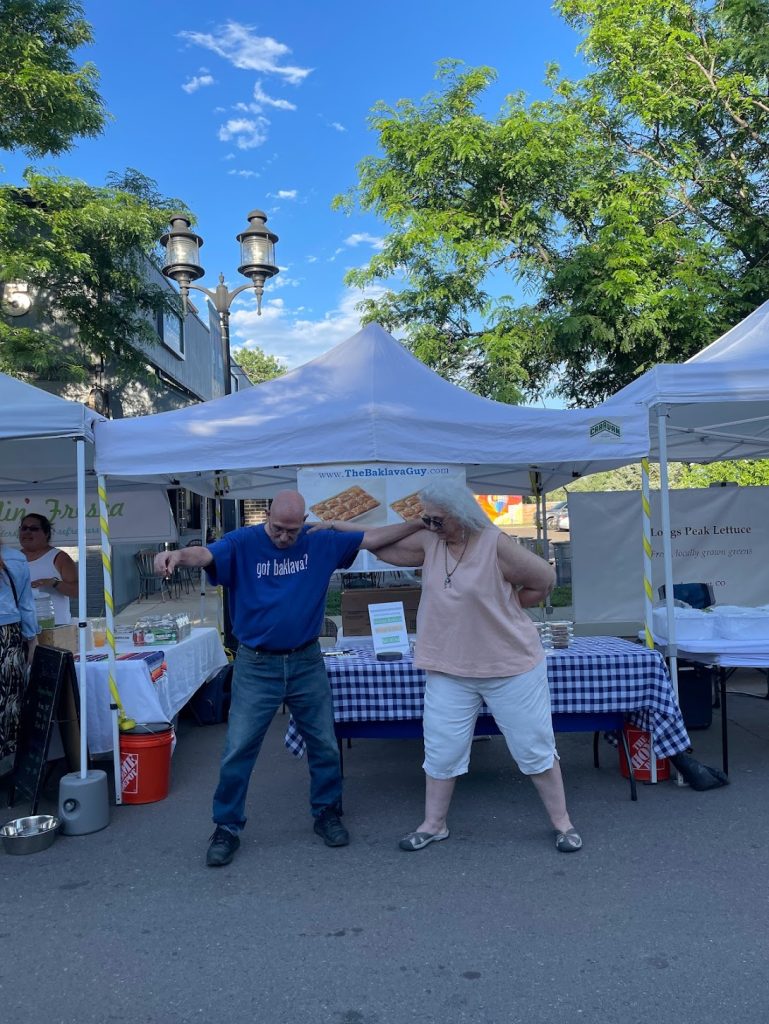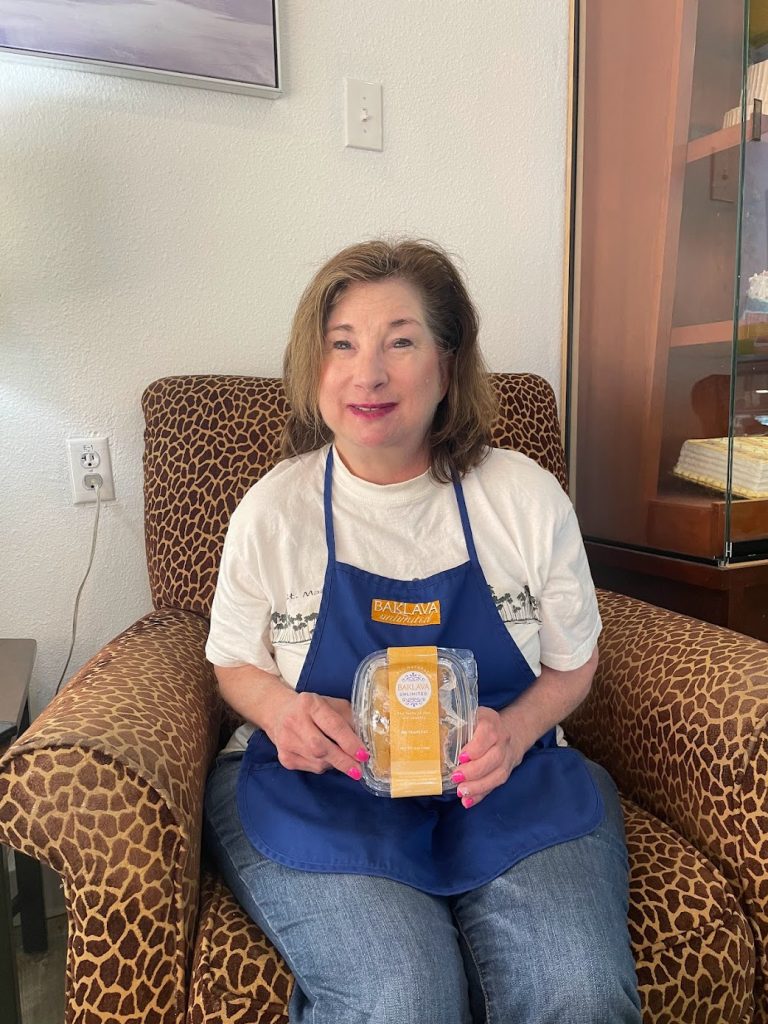
On a scorching July afternoon, Donald Vukovic stands half in, half out of his booth at the Erie Farmers Market.
With Greek folk music playing from a portable speaker, The Baklava Guy booth rarely goes unnoticed. More often than not, curiosity wins over passersby who can’t help but ask questions about the pastry while making their purchases. Vukovic is more than happy to oblige.
Baklava is the product of cultural exchange over millennia, a recipe born from regionally available ingredients and shaped by ancient trade routes that served wealthy empires and their rulers.
The flaky dessert originated with a simple recipe from the 8th century B.C., where the Assyrians — located in modern-day Iraq, Iran, Turkey and Syria — layered nuts and honey over coarse, unleavened bread. The ingredients were costly, and only the upper echelons of Assyrian society were afforded this luxury.
The Assyrian Empire eventually cascaded into Neo-Babylonian rule, then to Persian control until the Macedonians of ancient Greece conquered Asia Minor. Amid the many cycles of cultural imperialism that stamped out regional traditions to consolidate a new empire’s power, baklava endured — and evolved.

Baklava was likely available for purchase along various points of the Silk Road. A network of routes spanning from northern China over the Karakoram and Hindu Kush mountains and across the Taklamakan desert opened trade relationships with Mediterranean, Mesopotamian and Persian societies. This network likely influenced the cultural variations of baklava, from rosewater-scented pastry to varying nut blends and spices that reflect regional tastes.
According to Vukovic, the nutty delicacy’s storied history means the question of who may lay claim to the cultural heritage of baklava is complicated.
“Greek people will claim they invented baklava. But the truth is it came from Turkey first,” he says. “The original Turkish version of baklava was simpler. The Greeks did invent phyllo, so you can say that they made their own version of baklava, which is the kind most of us recognize today.”
The primary difference is the nut base: Turkish-style baklava uses pistachios, while the Greek version uses walnuts. Vukovic makes both — plus almond and pecan versions — but current pistachio prices prevent him from producing the classic Turkish version.
“The Turks have a saying: ‘I’m not rich enough to eat baklava every day,’” he says.
Vukovic’s walnut baklava is elegant, thanks to a refined simplicity: crispy, buttered phyllo pastry, local clover honey and fresh, hand-spiced walnuts. It’s sweet but not too sweet, with just a quarter-cup of honey in an entire tray, allowing the blend of cinnamon, nutmeg and cloves to shine.
The recipe came from his father, a Serbian immigrant (back when the nation was known as Yugoslavia), who taught Vukovic and his brother how to prepare dishes from the Old World from a young age. After Vukovic served in the U.S. Air Force, he settled in Colorado to pursue an engineering career. At that point, baklava was little more than a childhood memory.

The business idea came to Vukovic when he joined the Boulder International Folk Dancers (BIFD) in the 1980s, which gathered weekly at the Avalon Ballroom. Together, dancers learned and performed Greek, Croatian, Serbian, Turkish, Israeli, Bulgarian, Romanian, Hungarian and Russian dances. Vukovic met his partner, Donlyn Arbuthnot, through BIFD in 2002. A local historian, her grandfather was the sheriff of Gold Hill and Haystack Mountain in 1859.
“Everyone knows that when Donald’s cooking, it’s going to be good,” Arbuthnot says.
When the BIFD troupe gathered for meals and holiday celebrations, or after their travels abroad to learn new folk dances, Vukovic unearthed his father’s baklava recipe. After making a few tweaks, he started contributing a tray or two to the events. Soon, he was asked by fellow dancers to prepare additional trays for family gatherings, weddings, baptisms and showers.
In 1995, Vukovic officially founded The Baklava Guy and set his operation up in a commercial kitchen. When the Colorado Cottage Foods Act passed in 2012, allowing small vendors to sell shelf-stable food products directly to consumers without licensing or inspections, he was able to give up his costly commercial kitchen lease.
Baking from home allows Vukovic to keep his costs low, so he can afford his booth space at the Erie Farmers Market and offer his baklava at an affordable price. He also uses an online system for custom orders delivered directly.
For most marketgoers, $4 for two pieces of baklava is not a hard sell.
“Baklava is how he shows his love,” Arbuthnot says, as Vukovic attends to an eager line of customers.
The queen of baklava
Across the county, Janet Heath’s Longmont-based baklava business has served customers from Montana to New Mexico.
In 2010, Heath moved to Colorado from Arkansas. As a newcomer starting fresh, she sought community at the Saints Peter & Paul Greek Orthodox Church on Jay Road.

“They’re welcoming of everybody who wants to be a part of that community,” Heath says.
Soon after joining the congregation, she and her husband, Alan, started contributing to the Northern Colorado Greek Festival. Together, they baked baklava and spanakopita and pitched in when other congregants needed help prepping their booths.
After pitching in at the festival for several years, Heath began fielding requests for baklava from fellow churchgoers. At this point, she had been away from her professional field — information technology — for several years and realized she didn’t want to return to her former role. Instead, she decided to go all in on a baklava business. Heath incorporated Baklava Unlimited in 2012.
“We started out the original recipe with three nuts: almonds, pecans and walnuts,” Heath says. Today, her recipe uses a 100% almond base spiced with cinnamon and nutmeg and layered between sticky-sweet, chewy, buttered phyllo. Heath uses clover honey from the Colorado Honey Company in Loveland because “local honey is good for the immune system.”
Although the holidays are her busiest season, Heath says baklava is a year-round treat. While it tastes best right out of the oven, baklava is shelf stable for up to two months if stored in an airtight container.
Heath bakes 12 to 16 trays weekly through a commercial kitchen lease with the Longmont Bakery. Her largest client, Whole Foods Market, sells Baklava Unlimited in nearly every location across the Rocky Mountain region. Her products are also sold in Natural Grocers along the Front Range.














